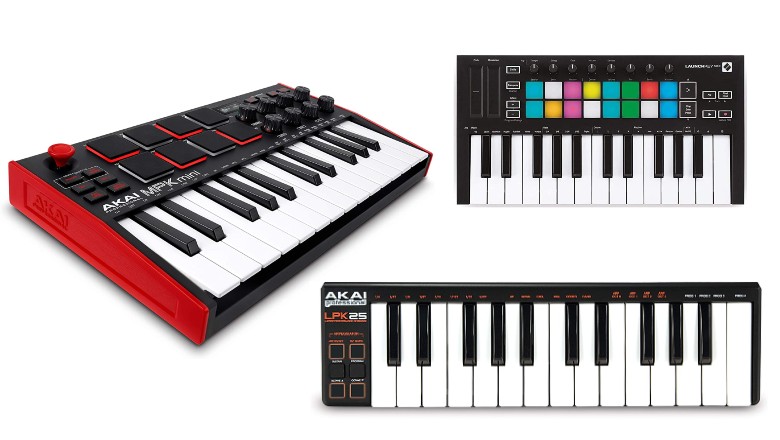
Amazon
When you’re starting out in music production, there are a lot of different options, and when I say a lot, I mean A LOT. Before you need to worry about which is the best DAW or why reference headphones are better than ear-smashing bass-blasters, you need to find the right tool for the job. Get the wrong tool and it’s game over. That’s why we’re here to bring you the very best midi keyboards for beginners looking to make the jump into the world of online music.
Also of Interest: 15 Best High-End Headphones
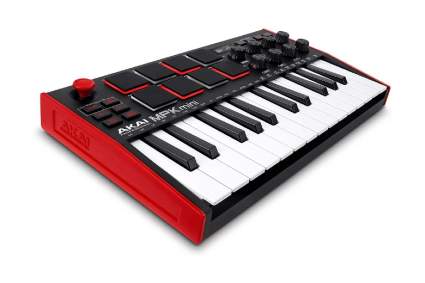
|
Amazon Customer Reviews
|
Price: $99.00 Shop at Amazon | Shop now Read our review |
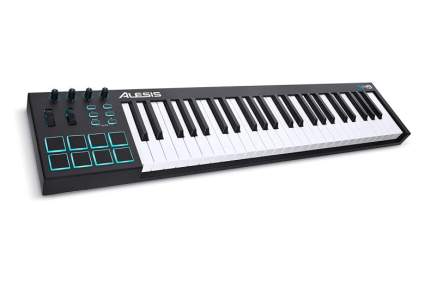
|
Amazon Customer Reviews
|
Price: $149.00 Shop at Amazon | Shop now Read our review |
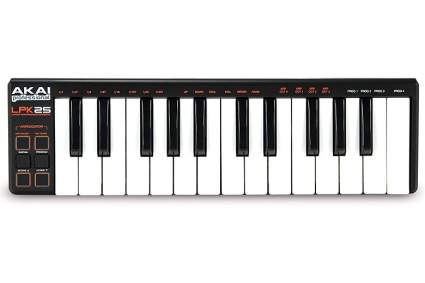
|
Amazon Customer Reviews
|
Price: $63.24 Shop at Amazon | Shop now Read our review |
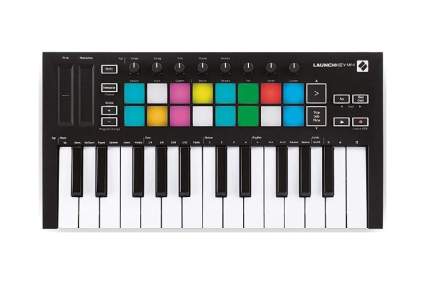
|
Amazon Customer Reviews
|
Price: $89.99 Shop at Amazon | Shop now Read our review |
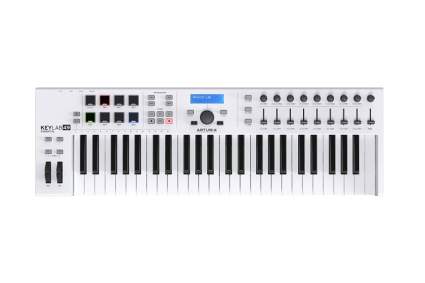
|
Amazon Customer Reviews
|
Price: $219.00 Shop at Amazon | Shop now Read our review |
-
1. AKAI Professional MPK Mini MK3
Pros:- Amazing value
- Perfect for newcomers looking to make hip hop
- Weighted keys
- Extensive software included
Cons:- Weighted keys take a minute to get used to
- Software is great, but daunting at first
- Some of the 1500 sounds won't be used
The AKAI Professional MPK Mini MK3 is a serious piece of tech that’s perfect for newcomers to the world of midi keyboards. In fact, it’s the midi controller I use.
Despite its smaller form factor, it’s got everything you need to get underway. It’s a 25-key keyboard and each of the keys are weighted, meaning you get a different note depending on how hard you press. You absolutely want that. Do not start with non-weighted keys because you’ll be causing yourself more problems down the line.
There are also eight drum pads, programmable knobs to load with different plugins, and a thumbstick for controlling the pitch of different keys. The MPK Mini MK3 also comes with a deep software to get you up and running complete with over 1500 different sounds.
So, why is this one of the best midi keyboards for beginners? It’s the simplicity. You get a digital workstation software included with the MPK Mini, so you’re free to start making sounds in a flash. All you really need to know to get started is how to press keys and slam drum pads. The more detailed stuff like programming the knobs and loading in presets can come at a later date once you’ve got the basics down.
-
2. Alesis V49 – 49 Key USB MIDI Keyboard
Pros:- Outstanding value thanks to the included software
- Near full-sized keyboard
- Easy to understand what each button does
Cons:- Slightly more pricey than other offerings
- Some of the software may be too advance for newcomers (the rest isn't, though)
- Not as portable as other minis due to futher keys
The Alesis V49 is a solid choice if you want to jump in with a near full-sized piano keyboard.
With the offering from Akai and Novation, you’re working on a much smaller scale, which is great for beginners but can be a problem in the long run if you just want to jam out without worrying about loading the right notes onto specific keys. Many of us who use midi keyboards often don’t worry about learning cords, simply because we can program a chord onto a pad. And let’s face it, pressing one pad is easier than mastering three fingers.
All that said, if you’re looking to learn to play music on a keyboard, it’s going to be a lot easier to master if you’ve got more than 25 keys. If you are planning to learn piano, then the Alesis V49 is a solid choice.
Along with the keyboard, the V49 also boasts octave up and down buttons to control the pitch, modulation buttons, and four programmable knobs.
You also get a ton of killer music software to play around in, including ProTools, First Alesis Edition, Ableton Live Lite 9 and Eleven Lite, Mini Grand, DB-33, and Xpand 2.
The beauty of the Alesis V49 is it’s a package with a lot of choice. For music production, it rocks, and for learning to play keyboard in a digital setting, it nails that too.
-
3. AKAI Professional LPK25
Pros:- Affordable
- 25 keys
- Comes with software
Cons:- Keys aren't perfect
- Lacks the drum pads seen on the MPK Mini
- And the programmable knobs
The AKAI Professional LPK25 is a slimmed-down version of the MPK Mini 3 with a lower price to boot. If you’re not sure how well you’ll take to midi keyboards, this is an affordable way to jump in without breaking the bank.
This 13-inch, 25-key midi keyboard features velocity-sensitive mini-keyboard keys and boasts an arpeggiator, which lets the artist create intricate sounds and beats. While you lose the drum pads from the MPK Mini, that’s not the end of the world. Load a drum track and you can use the keys as a drum instead.
It also comes with the MPC Beats Software, so you’ll be able to get up and running in around 10 minutes.
Personally, I’d still pick the MPK Mini MK3 over the LPK25 due to the inclusion of the drum pads and programable knobs. That said, if you’re after something wallet-friendly to see whether midi keyboards are for you, or you’re after something that’s easy to pick up, the LPK25 is definitely worth considering.
-
4. Novation Launchkey Mini MK3
Pros:- Macro control
- Perfect for Ableton Live
- Solid keys
Cons:- I'd avoid Ableton Live if you're new
- Instructions could be clearer
- Pad sensitivity could be better
Not to be confused with the Akai MPK Mini MK3, the Novation Launchkey Mini MK3 is another solid alternative.
This is another 25-key midi keyboard that is what you want if Ableton Live is going to be your DAW (digital audio workstation) of choice. If offers device Macro control including track select, MIDI capture, clip and scene launch, record/stop/mute/solo, volume, pans and sends. In short, you’ll be able to use this midi keyboard with Ableton Live and control almost everything at the press of a button.
I do need to point out, Ableton Live isn’t the most user-friendly experience if you’re new – it’s a program you work up to. That’s why I’d recommend grabbing the Novation Launchkey and trying it out with something like GarageBand or Soundtrap rather than Ableton Live. You’ll still get the basic functionality of the keys and pads, but this route would let you learn the ropes at your own pace rather than getting stumped because of how in-depth Abelton Live is.
-
5. Arturia Keylab 49 Essential
Pros:- Does just about everything
- Near full-sized
- Comes with software
- A solid choice if you want to learn to play the keyboard
Cons:- Pricey
- If you're not learning to play the keyboard, you may not need the extra size
- Installation could be easier
The Arturia Keylab 49 Essential has everything you could ever need, to the point where you most likely will never need to upgrade again.
It is, however, only for beginners who are certain this is their path or are determined to make it work. It’s pricey, but if you’re serious, there’s nothing wrong with starting off with the best tech out there.
This is a near full-sized midi keyboard designed for creating, live performance, editing – you name it, this keyboard can do it. If it’s killer sounds and powerful features you’re after, the Keylab Essential does it all.
This isn’t just the keyboard you’re getting here either. You also get access to Analog Lab, with tag-based access to over 6500 presets to tweak the keyboard for what you need, as well as Ableton Live Lite and Grand Piano Model D – the latter of which will let musicians play piano live.
Admittedly, there is a lot here to get your head around in the long term, but for beginners, all you need to understand is the piano and pad parts to get up and running. All the knobs and presets (which you will need later down the line) can be learned once you’re comfortable with your keyboard and its software.
What Is The Best DAW for Beginners?
Finding the right digital audio workstation (DAW) is key to music production. The problem, however, is knowing which are the best for beginners and which are for more season veterans.
If you're new, one of the best places to start is SoundTrap by Spotify.
SoundTrap is as complex as you need it to be. You'll be able to record loops and layer them up to create something deeper all for free. Should you wish for more features, there are subscription options available ranging from $7.99 per month for aspiring creators and up to $13.99 per month for everything SoundTrap has to offer.
The beauty of SoundTrap is that it's browser-based, meaning you could run it on a Windows PC or you could run it on a Chromebook. It'll work wherever there's Internet access.
Alternatively, if you're on MAC or iPad, there's always Apple's own GarageBand. I'm still playing around with GarageBand but so far I'm impressed. It's easy to key up and running and recording is as straightforward as they come. If you're using a midi controller on iPad, just keep in mind you'll need a USB and charger converter to hook the keyboard up to the iPad.
Finally, there's also BandLab, which is another cloud-based music production software with dedicated apps on iOS and Android.
BandLab has seen massive growth in popularity of late. In fact, since 2019, the company has seen a 150 percent increase in users, now totaling a massive 30 million.
Weighted vs Non-Weighted Keys
This is a case of velocity. On pianos, you have hammer-weighted keys which produce a different sound based on how hard, or gently, you press the key down.
Nowadays, a lot of midi keyboards feature weighted keys in a bid to both emulate real pianos and to create more sounds than a non-weighted key.
Is one better than the other? Kind of. Weighted keys can result in different sounds so of course you're going to get more varied music out of them. Non-weighted, however, are easier to get to grips with as you won't need to worry about how hard you're pressing the key. You'll hit it and it'll make the one sound.
When it comes to virtual music production, I would err on the side of weighted-keys, though, just because having more options from the off is better in the long run.
Can Midi Keyboards Work as Piano Keyboards?
In short: Yes and no.
With a grand piano app and a decent set of speakers or headphones, you'll be to hook up your midi keyboard to a computer and play it like the real thing. Just open the software, plug in the midi, and once it's all installed you'll be able to play like it's a real keyboard.
What you can't do is press a button on the midi keyboard and have it work. Most will need to be plugged into a computer (or a capable device) to make music.
Best Headphones for Midi Controllers
For music production, reference headphones are a must. The reason being, different headphones have different selling points. If a set of headphones have pumping bass, while that's great news for bass-heads, it's not going to reproduce other sounds as they're intended.
Reference headphones are designed to reproduce sound in its purest form - exactly as it's meant to sound. By all means when you've wrapped a song, switch out to your favorite headphones to see how it all gels, but for the actual production, you need a powerful set of open-back reference headphones, ideally, like the Sennheiser HD 650.
If you're starting out, by all means use your headphones of choice to get up and running. Just keep in mind down the line when you're making bank, you should really upgrade them to something more powerful.
See Also: